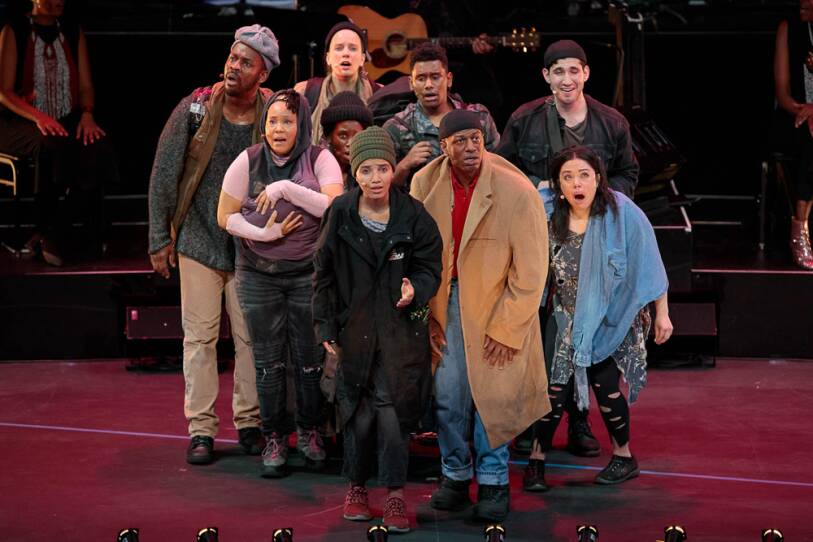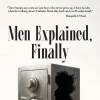When composer and multi-instrumentalist Toshi Reagon first received a copy of Octavia E. Butler’s “Parable of the Sower,” she was already familiar with the late author’s work. But something about it felt more unsettling than her other novels. It was present and immediate and what Reagon called “strangely available."
Written in 1993, the first few pages of “Parable of the Sower” introduce readers to a Southern California ravaged by climate disaster violence, and the ills of corruption and capitalism. “With a lot of her other books, you can formulate a distance to the story,” Reagon explained. “It might be about aliens and things, and as you read it, you discover yourself in it. But parable, just from the beginning, like the first page, I was like, ‘This is... I don't know.’”
She soon found out. And then, she wrote an opera about it.
Reagon’s “Parable of the Sower,” featuring music and a libretto co-authored by her mother Bernice Johnson Reagon, made its world premiere in Abu Dhabi in November 2017. It opens in Boston next week, April 21 through April 24, by way of ArtsEmerson.
Operatic adaptations have many creative and logistical hurdles to clear, and “Parable of the Sower” is no exception. While Butler’s award-winning novel isn’t what you’d consider a long book (the first edition clocks in at 299 pages), it’s laden with uncomfortable themes and a narrative format tied to the protagonist’s new religious movement, Earthseed. “We just knew it couldn’t be, like, five hours,” said Reagon. “But Octavia is brilliant and she really just laid the story out so well. We followed her directions.”
Musically, Reagon draws on the deep history of the Negro Spiritual, tying it to the story’s preacher of a father, using it in a way that represents the long Afro-American past. She crafted the protagonist, Lauren Olamina, so that her voice evolved across the spectrum of Black music, taking the audience “through time” along the way. A trio of characters called “talents” (one played by Reagon herself) are functional narrators. As they operate out of time, they can sing however they want, regardless of idiomatic musical anachronism.
The result is what Reagon calls a “congregational opera.” It’s far from a tidy or convenient genre description, but as she explained to Minnesota Public Radio in 2019, “it does really describe what we’re trying to do, which is have everybody — the audience, the cast and the music — occupy a space and an energy together, and to take that togetherness as an opportunity.”

The existence of “Parable of the Sower” as opera is equally tied to Bernice Johnson Reagon, Toshi’s mother. Born in southwestern Georgia in 1942, she was an active participant in the Civil Rights Movement’s 1960s incarnation. She was a founding member of the Freedom Singers, a vocal quartet whose performers provided support for a number of civil rights campaigns, including those of the Student Nonviolent Coordinating Committee. In the 1970s, Bernice Johnson Reagon obtained her Ph.D. from Howard University, where she also worked with the Smithsonian Institute’s Folklife Festival. She was the music director of the DC Black Repertory, whose space housed independent theater and dance companies.
This flurry of musical and community activity was foundational to the Washington, D.C. in which Toshi Reagon would be raised. “Now I realize how incredible it was,” Toshi Reagon reminisced. “All of these young, black artists creating work together was fantastic. I got to see things start from a very small place and eventually end up on a stage, and run night after night.I loved that as a kid. So I kind of already just had a sense that you could tell any story you wanted to, it was just about putting the community together to do it.”
Now, she has a crew about 30 strong, and is ready to bring “Parable of the Sower” back to a post-lockdown world. It’s tempting to draw parallels between the new COVID-era production, taking place amid war, random acts of violence a climate crisis, and the bleak setting of the Butler novel. Reagon, however, does not make such a comparison — because plagues of the world aren’t new. “Humans are just kind of ridiculous about the truth of their existence,” the composer opined. “We’re wonderful, but we’re the most destructive force on the planet. It is us. It is human beings. And [we have an] inability to hold onto some simple truths about the fact that we are literally earthlings — like everything else that breathes and lives here. Like, we’re not different than grass.”
As long as humans keep being human, this world will always be an appropriate planetary venue for a “Parable of the Sower.”
ArtsEmerson presents “Parable of the Sower” April 21 through April 24 at the Emerson Cultler Majestic Theatre






